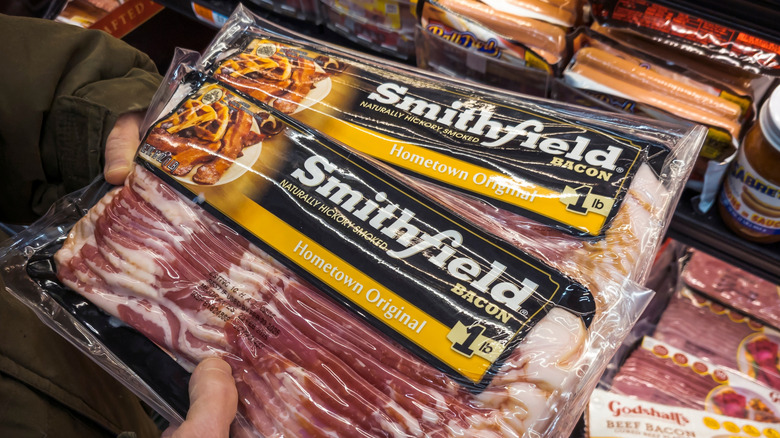Top 10 Controversies in Smithfield Foods' History

The Evolution of Smithfield and Its Controversial Legacy
Once a small meatpacking company formed in Virginia in 1936, Smithfield has grown into one of the largest food producers in the United States. Specializing in pork, the company played a significant role in popularizing Virginia ham and contributing to the rise of bacon as a staple of the classic American breakfast. Over the years, Smithfield expanded its operations to include various pork products, deli meats, and more. However, despite its prominence, the company no longer produces many of its original signature items. For instance, the last genuine Smithfield ham is on display in a Virginia museum, and some of its offerings, like its staple American hot dog, are now produced by a Chinese company.
These changes reflect business decisions aimed at remaining competitive in an evolving global market. However, Smithfield's practices, power, and company culture have led to numerous scandals and controversies over the years. Here’s a look at some of the most notable issues that have drawn scrutiny and government investigations.
Animal Welfare Concerns
In 2007, Smithfield announced it would stop using gestation crates, a controversial method of housing pregnant pigs. These crates confine pigs in spaces barely larger than their bodies, limiting their movement. While animal welfare groups initially praised this decision, investigations revealed that the company was still using gestation crates. In 2017, Direct Action Everywhere placed spies at multiple Smithfield-run pig farms in North Carolina and found evidence that the company had not fully phased out the practice. Smithfield claimed the pigs observed were in different crates or not actually pregnant, but the allegations raised serious concerns about the company’s commitment to animal welfare.
Child Labor Allegations
Smithfield Packaged Meats, a division of Smithfield Foods, faced accusations of employing underage workers. In St. James, Minnesota, the state’s Department of Labor and Industry discovered that between April 2021 and April 2023, the facility used 11 minors aged 14 to 17, with three starting at age 14. Many worked past legal hours and were exposed to hazardous conditions. Although Smithfield denied knowledge of these violations, it agreed to pay a $2 million settlement without admitting fault.
Price-Fixing Allegations
Smithfield Foods was accused of colluding with other industry players to limit pork supply and drive up prices. Between 2009 and 2022, the company allegedly held back product to create artificial scarcity. This led to multiple lawsuits, which Smithfield settled with large payouts, including $83 million to suppliers, $42 million to restaurants, and $75 million in a consumer class-action case.
Environmental Pollution
Environmental concerns have also plagued Smithfield. In 2021, advocacy groups filed a complaint with the Federal Trade Commission, accusing the company of misleading claims about its environmental sustainability. They highlighted that Smithfield was potentially the third-largest source of water pollution in the U.S. and was cited for environmental violations 66 times in 2019 alone.
In the 1990s, Smithfield set a record for the largest fine under the Clean Water Act. In 1997, the company was fined $12.6 million for illegally dumping waste into local rivers, leading to dangerous levels of coliform bacteria. The company also falsified water quality test results, further compounding the issue.
Product Recalls
Smithfield has faced several product recalls due to safety concerns. In 2021, the company recalled 10,900 pounds of pepperoni after tests found Bacillus cereus, a bacteria that can cause severe gastrointestinal illness. In 2022, Smithfield recalled 185,000 pounds of bacon crumbles after a customer found a metallic object in the product.
Odor and Nuisance Lawsuits
The smell from Smithfield’s hog farming operations became so severe that it led to legal action. In eastern North Carolina, residents filed lawsuits against Smithfield subsidiaries for the nuisance caused by hog waste lagoons. One case resulted in a $473.5 million judgment, though the state capped payments at $94 million for six affected neighbors.
Human Trafficking Scandal
In the mid-2000s, Smithfield was implicated in a human trafficking scandal involving its subsidiary Circle Four Farms in Utah. A recruitment firm brought Thai laborers to the U.S. under false pretenses, charging them high fees and confiscating passports. Workers reported being treated as slaves, with poor living conditions and withheld wages.
Impact of the Coronavirus Pandemic
During the early days of the pandemic, Smithfield’s facilities became hotspots for COVID-19 infections. In Sioux Falls, South Dakota, the plant became the largest infection zone in the U.S., with over 600 cases. Similarly, the Patrick Cudahy plant in Wisconsin saw a rapid spread of the virus due to inadequate safety measures.
Smithfield’s history is marked by both growth and controversy, reflecting the challenges of large-scale food production in a modern, globalized world.

Posting Komentar untuk "Top 10 Controversies in Smithfield Foods' History"
Posting Komentar